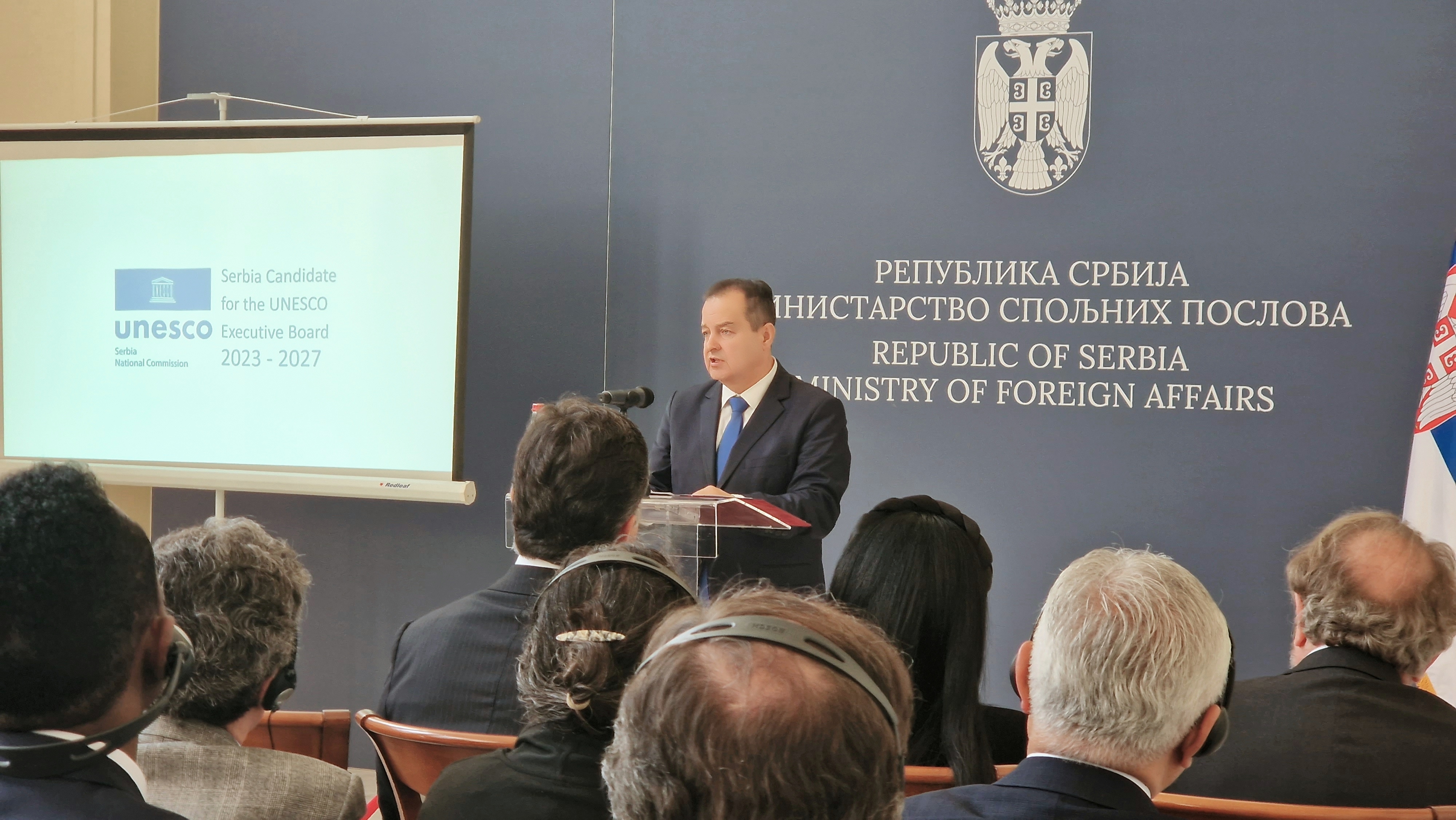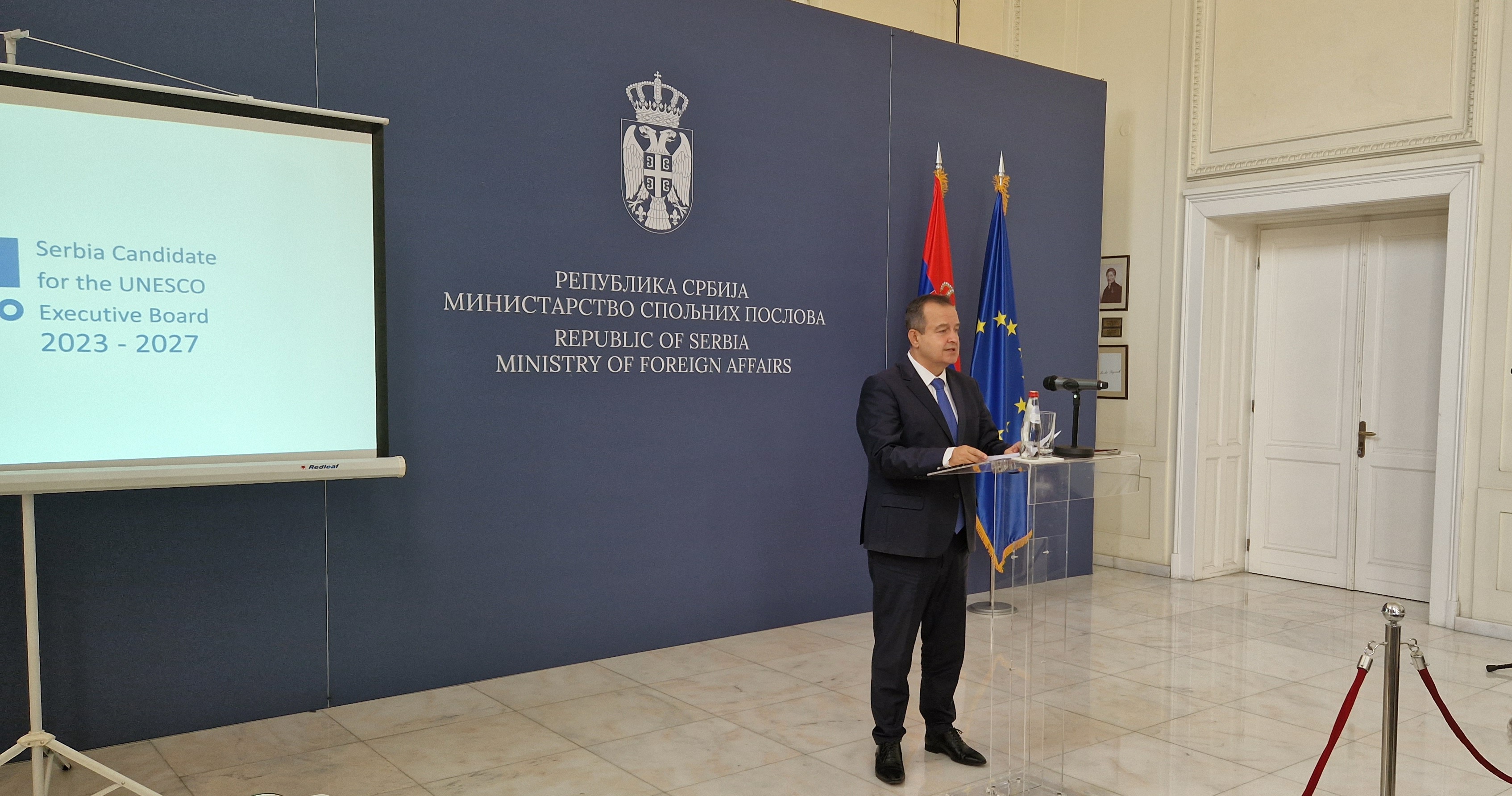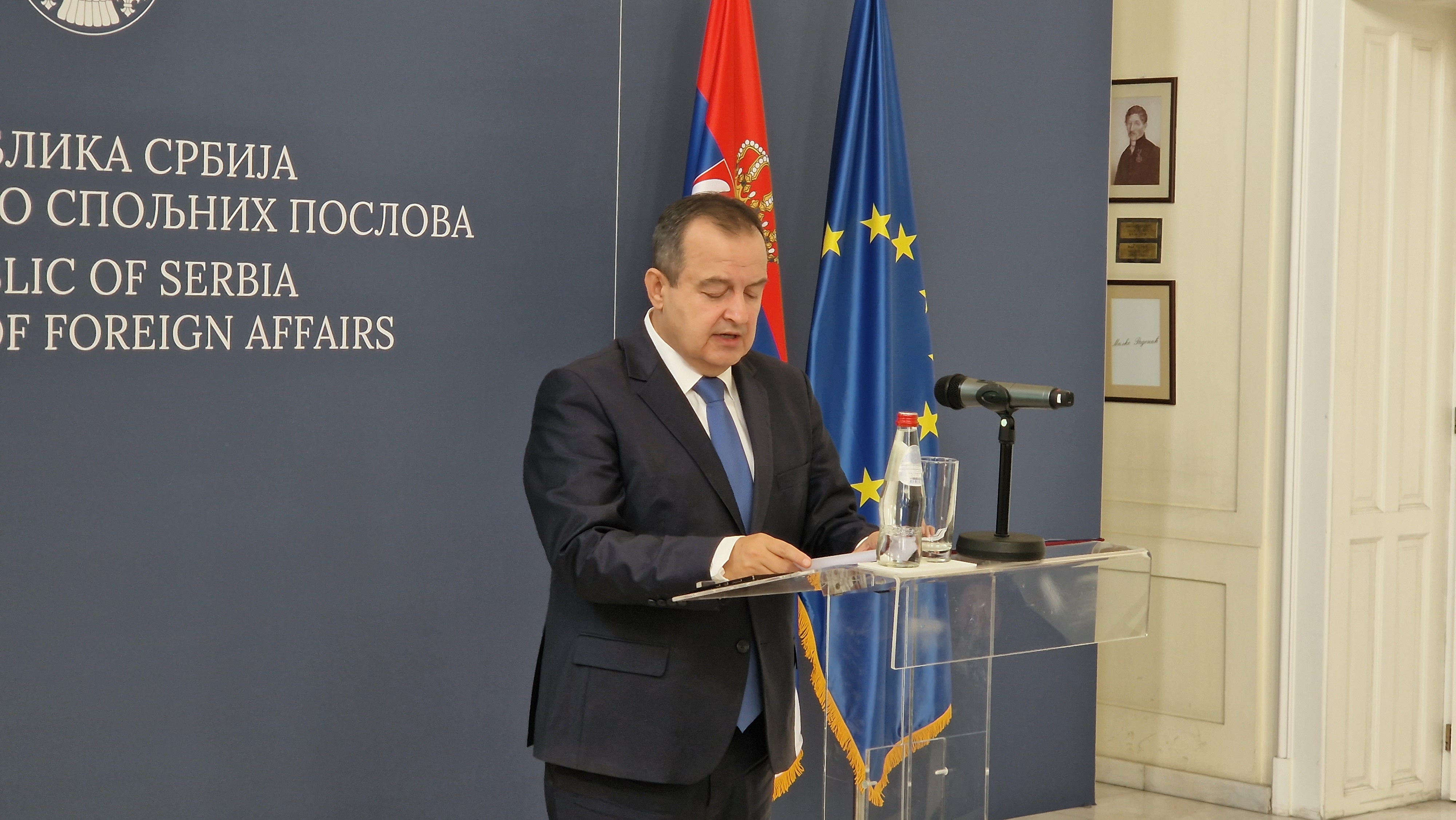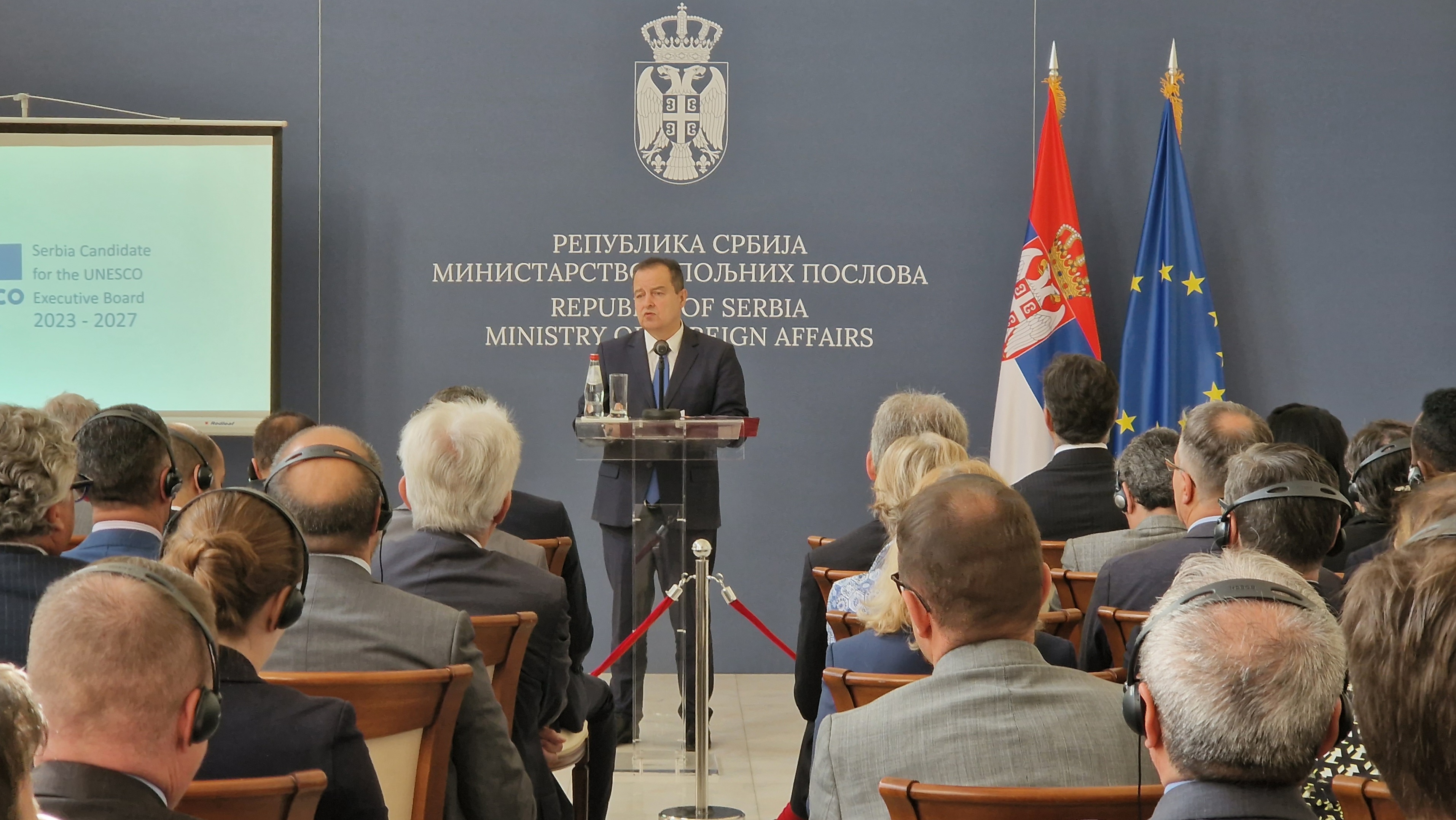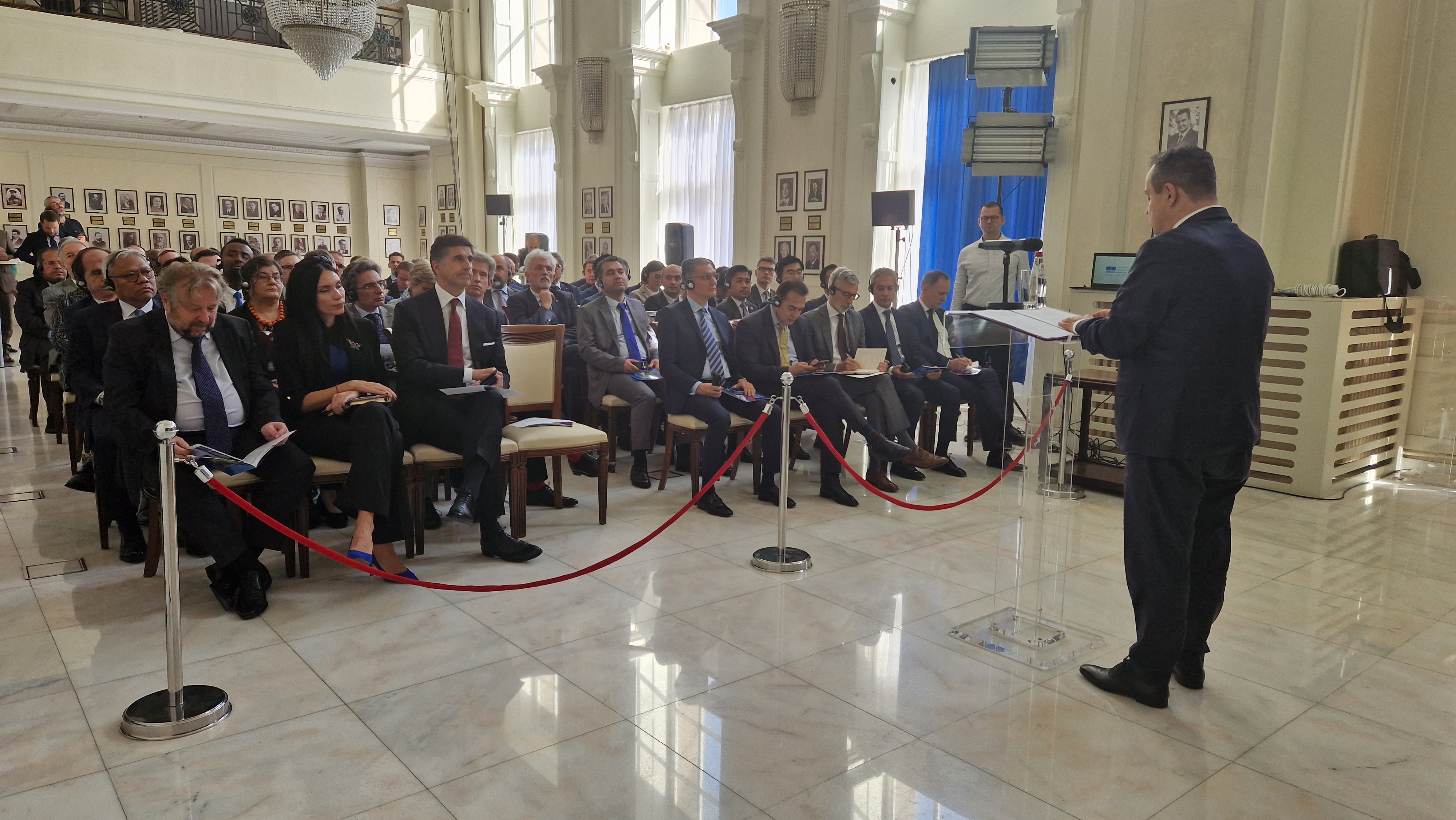Minister Dacic holds a briefing for ambassadors accredited to the Republic of Serbia
Full address by Minister Dacic reads as follows:
„Excellencies,
Esteemed guests,
At the outset, I would like to welcome you on behalf of the Ministry of Foreign Affairs and on my own behalf. I am delighted that you that you accepted the invitation to attend the promotion of our candidacy for a seat on the UNESCO Executive Board, for the 2023-2027 term, in the elections that will be held on 15 and 17 November in Paris, during the 42nd session of the General Conference.
As a small European country committed to respecting the fundamental principles in international relations based on international law and the Charter of the United Nations, Serbia advocates for the strengthening of multilateralism as a basis for our further activities and efforts at the broader international level. In the same context, we also see our candidacy for the Executive Board of UNESCO, an organization with a mandate to contribute to the building of lasting peace through intergovernmental cooperation and dialogue in the fields of education, science and culture. Undoubtedly, the role of UNESCO is even more significant and visible today than in the past period.
I am pleased to point out that these were also the principles that guided us during our tenure as chair of the Executive Board, which is about to end. In extremely difficult global circumstances, Serbia, as chair of the Executive Board, strived to efficiently and pragmatically contribute to reaching compromise solutions to all issues in UNESCO in order to strengthen the role of this organization.
Proceeding from these key foundations of our activities, allow me to outline some of the priorities on which our activities in the Executive Board will be based, if we are elected. At the same time, this candidacy should also be perceived within the framework of our overall strategic foreign policy priorities, based on our European orientation.
1. Serbia has continuously and comprehensively supported UNESCO's "Priority Africa" in accordance with Agenda 2030, Agenda 2063 of the African Union and the needs and priorities of the African countries themselves. The Republic of Serbia is one of the silver donors of the African World Heritage Fund and founders of the Group of Friends of Africa in UNESCO. Serbia is implementing, by now as a matter of tradition, the Government’s World in Serbia program, which annually provides scholarships to around two hundred students from developing countries, records exceptional results and demonstrates our lasting commitment to nurturing and developing cooperation with African countries.
2. We are ready to share with developing countries the exceptional experiences and achievements that Serbia recorded in the past period, for example in the field of creative industries, where a growth of 60% has been recorded since 2014, and in only two years (2019-2021) a rise in GDP of 6%, creating 155,138 new jobs for young people aged 25-45, of whom 45% have higher education, and 49% are employed women. In cooperation with partners, our experiences in the field of creative economy and artificial intelligence can contribute to UNESCO once again becoming a development center and a place of gathering and exchange of ideas, which represents a chance of special importance for developing countries.
3. For us, education is a pillar and driver of sustainable development and Agenda 2030 - Sustainable Development Goal 4 (SDG 4), and we believe that UNESCO has rightly been given a leading role in its implementation. The full contribution of Serbia, where primary and secondary education is free, as is higher education for talents and students in unfavourable financial situations, is also reflected in the inclusion of migrants and internally displaced persons in realizing one of the basic rights - the right to education. National minorities are given the opportunity to study in their mother tongue. The educational system of Serbia pays special attention to marginalized groups of Roma nationality, efforts are being made to reduce the number of boys who drop out of school, and especially Roma girls, by which we have joined the member states continuously implementing inclusive education programs.
4. The Republic of Serbia continues to take steps in accordance with the Gender Equality Strategy from 2021 to 2030. We adopted the Law on Gender Equality in 2021, which is harmonized with the EU acquis, pursuant to all international obligations. At the local level, we strive to establish mechanisms for the effective implementation of principles and recommendations for gender equality.
We are ready to share our experiences at UNESCO forums dedicated to this issue.
5. Culture is a power that is reflected in UNESCO through the respect for normative instruments of cultural conventions and programs that channel that power in the right way. The Republic of Serbia is deeply committed to and will continue to advocate for the observance and implementation of conventions, the most popular of which among member states are the Convention for the Safeguarding of the Intangible Cultural Heritage and the Convention concerning the Protection of World Cultural and Natural Heritage.
6. Serbia recognizes the intangible cultural heritage as an important factor in maintaining cultural diversity in the conditions of growing globalization, and for us, understanding the intangible cultural heritage of different communities is a means of establishing a dialogue among cultures that encourages mutual respect for different ways of life, which we will further promote. In the period ahead, Serbia will continue to actively participate in the work of the Regional Centre for the Safeguarding of Intangible Cultural Heritage in South-Eastern Europe under the auspices of UNESCO, seated in Sofia, and the South-East European Experts Network on Intangible Cultural Heritage under the auspices of UNESCO. So far, we have hosted the SEE expert network meetings twice (in May 2011 and in June 2023).
7. One of our priority tasks, much like of most member states, is to raise awareness of the growing threat to world heritage due to various factors such as climate change, armed conflicts and the frequent absence of the implementation of adequate measures recommended by the Convention Concerning the Protection of World Cultural and Natural Heritage.
Distinguished guests,
The Republic of Serbia will continue its activities and regular participation in the preparation and promotion of intergovernmental nominations that, in accordance with the basic goals of the organization, enhance and establish international and regional cooperation in the field of natural and cultural heritage protection in our area.
Allow me to remind you of some of the examples:
- The UNESCO Memory of the World list includes documentation that far exceeds the national importance, treasures such as Miroslav Gospel and Nikola Tesla’s Archive, as well as historical documents that marked watershed moments not only for Serbia but for the entire world.
- Serbian slava - celebration of family saint patron’s day, singing to the accompaniment of the gusle, Zlakusa pottery making, traditional folk dance – kolo, and social practices related to the preparation of the traditional plum spirit – the famous šljivovica are distinguishable and recognized as an intangible heritage of exceptional properties not only in UNESCO but much more widely, they are becoming a Serbian brand, they are a reflection of various types of cultural activities, providing an unquestionable contribution to the development of our country and attracting visitors from all over the world.
- Stećci Medieval Tombstone Graveyards, a joint regional nomination on the UNESCO World Heritage List, brought together experts from Bosnia and Herzegovina, Croatia, Montenegro and Serbia, and the pentalateral Mura-Drava-Danube biosphere reserve, which stretches across five states of our region, due to its exceptional properties and vastness is referred to as the European Amazon. Such UNESCO nominations, in which Serbia is one of the key participants, make an immeasurable contribution to regional cooperation, stability in the region and a firm commitment to peace on its path to the EU.
- We are especially proud of the fact that the Serbian monastery of Sopoćani was one of the first entries on the UNESCO World Heritage List, back in 1979.
Ladies and gentlemen,
As you already know, Serbia is extremely rich in diverse cultural heritage that spans the period from prehistory to the cultural entities of the modern era. The pinnacle of Serbian medieval artistic expression is represented in the best possible way through four Serbian monasteries in Kosovo and Metohija inscribed on the World Heritage List: Dečani, Gračanica, the Patriarchate of Peć and the Holy Virgin of Ljevisa. The cultural and historical heritage in Kosovo and Metohija, where 1300 holy sites are located, is a pillar of our national, cultural and spiritual identity.
Unfortunately, that heritage is not only being constantly exposed to attempts to rename and revise undeniable historical facts, but has also been physically threatened for many years. I am sorry to say that these monuments are also on the UNESCO List of World Heritage in Danger due to constant attacks, threats and risks that our people and our heritage in Kosovo and Metohija are continuously faced with.
International forces tasked with protecting Serbian cultural heritage are deployed only on certain cultural properties. I believe that you are well aware of the tragic facts when it comes to our cultural heritage in Kosovo and Metohija and the permanent threat to its protection.
Excellencies, dear friends,
In conclusion, allow me to sincerely thank you for the comprehensive cooperation and support so far from all your countries, members of UNESCO. We expect the continuation of joint activities in accordance with the needs of modern times. That is why your support is extremely important to us and I invite you to watch a short video presentation together. We also see receiving your support for our candidacy as a reaffirmation of the principles of understanding, respect for cultural diversity and a commitment to finding solutions in accordance with the UNESCO constitution and the pursuit of the organization's goals that can significantly contribute to the promotion of peace and tolerance. I assure you that we are ready to make such a contribution.
Thank you!“

